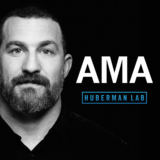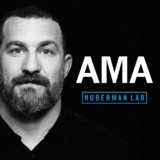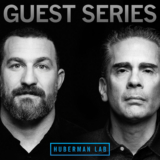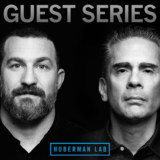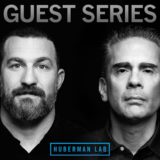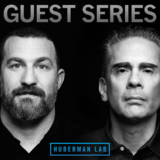In this episode, my guest is Dr. Adam Grant, Ph.D., a professor of organizational psychology at The Wharton School of the University of Pennsylvania, an expert ...
In this episode, I explain a specific writing protocol shown in hundreds of scientific studies to significantly improve immediate and long-term health. I ...
Recently I had the pleasure of hosting a live event in Toronto, Ontario. This event was part of a lecture series called The Brain Body Contract. My favorite ...
In this episode, my guest is Natalie Crawford, MD, a double board-certified physician specializing in obstetrics and gynecology, fertility and reproductive ...
In this episode, my guest is Dr. Michael Eisenberg, MD, a urologist and professor specializing in male sexual function and fertility at Stanford University. ...
Welcome to a preview of the 12th Ask Me Anything (AMA) episode, part of Huberman Lab Premium. The Huberman Lab Premium subscription was launched for two main ...
In this episode, I provide science-based tools and protocols to improve mood and mental health. These tools represent key takeaways from several recently ...
In this episode, my guests are Mark Zuckerberg, CEO of Meta (formerly Facebook, Inc.), and his wife, Dr. Priscilla Chan, M.D., co-founder and co-CEO of the ...
In this episode, my guest is Dr. Lisa Feldman Barrett, Ph.D., a Distinguished Professor of Psychology at Northeastern University who is a world expert in the ...
In this episode, I discuss neuroscience and psychology studies that address the basis of willpower and tenacity, how they differ from motivation and how we can ...
In this episode, my guest is Chris Voss, a former Federal Bureau of Investigation (FBI) agent who was the lead negotiator in many high-risk, high-consequence ...
Welcome to a preview of the 11th Ask Me Anything (AMA) episode, part of Huberman Lab Premium. The Huberman Lab Premium subscription was launched for two main ...
This is episode 4 of a 4-part special series on mental health with Stanford and Harvard-trained psychiatrist Dr. Paul Conti, M.D. Dr. Conti explains what true ...
In this episode, my guest is Dr. Vivek Murthy, M.D., the acting U.S. Surgeon General who earned his undergraduate degree from Harvard and his M.D. from Yale ...
This is episode 3 of a 4-part special series on mental health with Dr. Paul Conti, M.D., a psychiatrist who did his medical training at Stanford School of ...
In this episode, I describe how your brain and body are fundamentally wired to perceive and respond to music and how those responses can be leveraged to ...
This is episode 2 of a 4-part special series on mental health with Dr. Paul Conti, M.D., a Stanford and Harvard-trained psychiatrist currently running a ...
In this journal club episode, my guest is Stanford and Johns Hopkins-trained physician, Dr. Peter Attia, M.D., who is also the host of The Drive podcast and ...
This is episode 1 of a 4-part special series on mental health with psychiatrist Dr. Paul Conti, M.D., who trained at Stanford School of Medicine and completed ...
In this episode, my guest is Marc Andreessen, the legendary software innovator who co-created the internet browser Mosaic, co-founded Netscape, and is now at ...
- « Previous Page
- 1
- …
- 9
- 10
- 11
- 12
- 13
- …
- 19
- Next Page »


